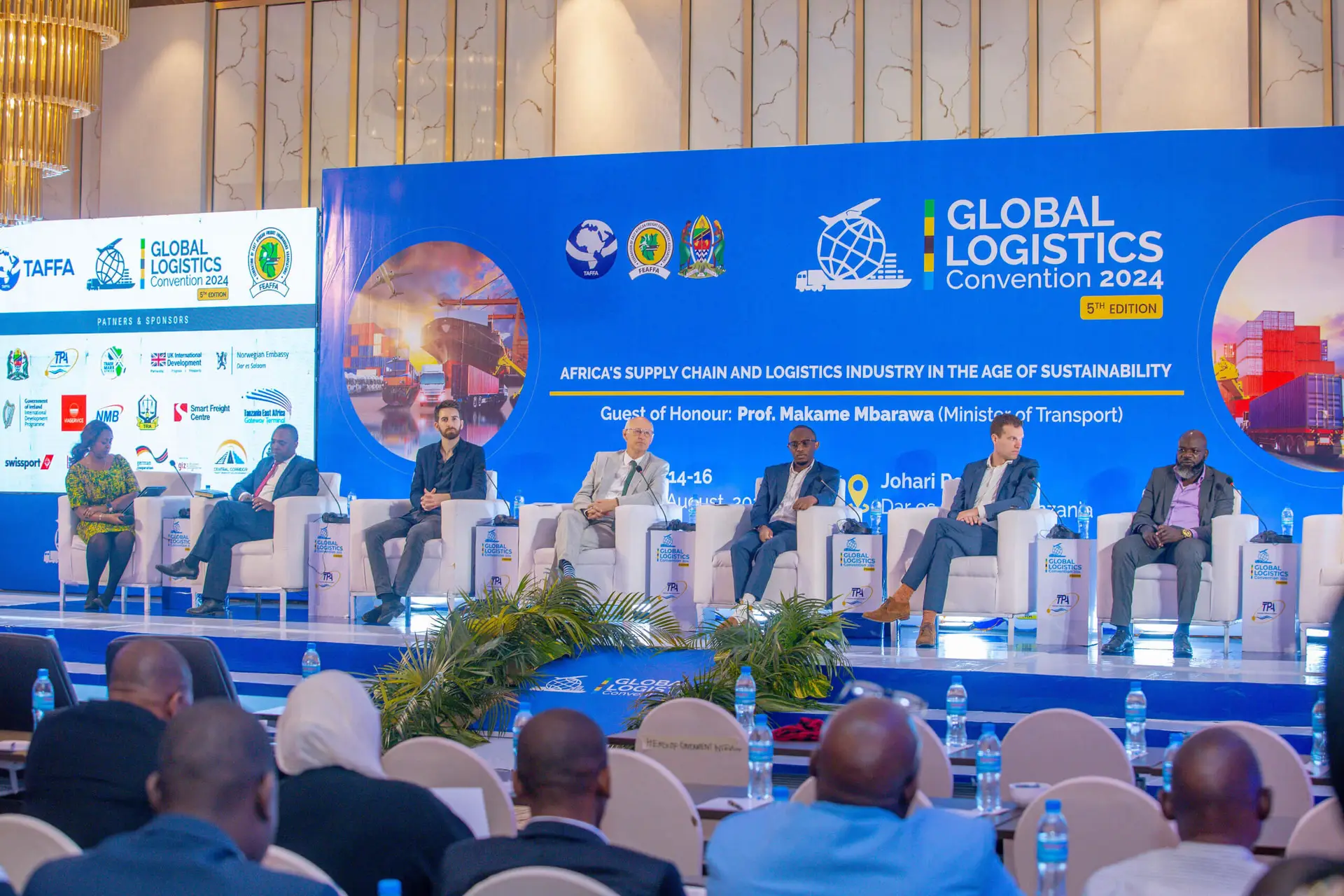The Smart Freight Centre and the Kuehne Climate Center have officially launched the Green Freight Support Programme at the Global Logistics Convention 2024, held in Dar es Salaam, Tanzania, from 14-16 August. This initiative, developed in collaboration with leading organisations such as TradeMark Africa, UNEP, and GIZ, is set to drive logistics decarbonisation efforts across Eastern Africa, with a focus on achieving sustainable freight practices.
“Decarbonising freight transport in one of the world’s fastest-growing regions is crucial for meeting global climate targets. This programme offers a collaborative platform for freight stakeholders to engage in sustainable practices, showcasing leadership in the transition to green logistics. We call on ambitious shippers, logistics service providers, and other organisations to join us in achieving zero-emission freight in Eastern Africa,” said Rik Arends, Director of Smart Freight Centre.
The Green Freight Support Programme is the result of a consultative process initiated by the Smart Freight Centre and Kuehne Climate Center in 2023. It addresses the rising greenhouse gas emissions linked to the region’s rapid trade and logistics expansion, aiming to create a future of efficient, low-emission, safe, and inclusive freight transport in Eastern Africa.
The programme serves as a unifying platform for shippers, carriers, and other stakeholders, enabling them to measure and report freight emissions and identify opportunities for reduction. It also supports carriers in enhancing the efficiency of their truck fleets and transitioning to zero-emission vehicles. Through extensive training, education, and research, the programme equips industry leaders and professionals in Eastern Africa with the tools and knowledge to adopt greener freight transport practices.
“The logistics sector is essential for trade and development, but it is also a major contributor to carbon emissions. As Eastern African countries transition to a low-carbon future, we are committed to helping local logistics stakeholders adopt and scale climate-friendly practices. While enthusiasm for greener freight systems is growing, there remains uncertainty around implementation. We look forward to building the competencies, networks, and innovations necessary for success,” commented Friedel Sehlleier, Project Manager at the Kuehne Climate Center.
Anthe Vrijlandt, Director of Strategy and Partnerships at TradeMark Africa underscored the importance of addressing the environmental impact of trade, particularly in transport and logistics. “As TradeMark Africa continues its mission to reduce trade costs and time in Africa, the Green Freight Support Programme aligns with our vision for a sustainable continent, reinforcing our commitment to a greener, more resilient future,” she remarked.
The programme also aligns with the strategic goals of the Northern Corridor Transit and Transport Coordination Authority (NCTTCA) and the Central Corridor Transit Transport Facilitation Agency (CCTTFA), supporting the development and implementation of their green freight strategies. With key partners such as the Shippers Council of Eastern Africa (SCEA) and the Federation of East African Freight Forwarders Association (FEAFFA), the programme will facilitate training and dialogue among shippers, freight forwarders, and carriers to accelerate the transition to green freight solutions.
“Our Strategic Plan 2021-2025 includes the roll-out of the Central Corridor Green Freight Programme, our response to the rising carbon emissions from transport activities along the Central Corridor. Support from the Kuehne Climate Center and Smart Freight Centre is timely in helping us define and implement a comprehensive Green Freight Strategy,” highlighted Adv. Flory Okandju Okonge, CCTTFA Executive Secretary.
Omae Nyarandi, NCTTCA Executive Secretary, noted, “The Northern Corridor is East and Central Africa’s busiest transport route, but sustainable freight solutions face challenges such as low public awareness and limited funding. Our Northern Corridor Green Freight Strategy 2030 aims to address these challenges and achieve a Net-Zero Emission Corridor by 2050. We welcome the Green Freight Support Programme and look forward to collaborative efforts in implementing our strategy.”
Bodo Immink, GIZ Country Director for Kenya, lauded the programme as a significant advancement in the collective effort toward sustainable economic development in Eastern Africa. “Germany, through GIZ, remains committed to this collaborative approach, recognising its potential to drive innovation and sustainable practices in the region’s logistics sector,” he stated.
Heavy-duty vehicles are major contributors to air pollution, road accidents, and climate emissions, noted Rob de Jong, Head of Sustainable Mobility Unit at UNEP. With the global vehicle fleet expected to double by 2050, transitioning to zero-emission vehicles is critical. “This programme will play a vital role in reducing emissions from the freight industry, mitigating its negative impacts on health, safety, and the environment,” he said. Martina Otto, Head of the Climate and Clean Air Coalition at UNEP, emphasised that the programme in Eastern Africa demonstrates the power of collaboration between governments, private companies, and civil society in driving sustainable change.
Elias Baluku, Acting Executive Director of FEAFFA, noted that while greening logistics is a relatively new concept for many customs agents and freight forwarders in the region, it is rapidly gaining momentum. He added that the programme will empower SMEs and other stakeholders to significantly reduce their carbon footprint, contributing to a zero-emissions transport and logistics industry in Eastern Africa.
Agayo Ogambi, CEO of the Shippers Council of Eastern Africa (SCEA), stressed that cargo owners will play a critical role in ensuring the sustainable production and procurement of low-carbon services, meeting market demands while contributing to a greener future.
Disclaimer: The views and opinions expressed in this article are those of the authors and do not necessarily reflect the official policy or position of TradeMark Africa.


